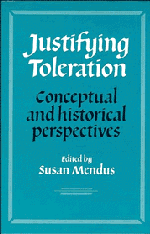Book contents
- Frontmatter
- Contents
- Preface
- Introduction
- 1 Scepticism and toleration in the seventeenth century
- 2 A more tolerant Hobbes?
- 3 Locke: toleration and the rationality of persecution
- 4 Toleration and Mill's liberty of thought and discussion
- 5 Rousseau and respect for others
- 6 The intolerable
- 7 Autonomy, toleration, and the harm principle
- 8 Friendship, truth, and politics: Hannah Arendt and toleration
- 9 Dissent, toleration, and civil rights in communism
- 10 Liberalism, marxism, and tolerance
- 11 Socialism and toleration
- Index
5 - Rousseau and respect for others
Published online by Cambridge University Press: 20 May 2010
- Frontmatter
- Contents
- Preface
- Introduction
- 1 Scepticism and toleration in the seventeenth century
- 2 A more tolerant Hobbes?
- 3 Locke: toleration and the rationality of persecution
- 4 Toleration and Mill's liberty of thought and discussion
- 5 Rousseau and respect for others
- 6 The intolerable
- 7 Autonomy, toleration, and the harm principle
- 8 Friendship, truth, and politics: Hannah Arendt and toleration
- 9 Dissent, toleration, and civil rights in communism
- 10 Liberalism, marxism, and tolerance
- 11 Socialism and toleration
- Index
Summary
PREAMBLE
It would widely be agreed that the question of the significance and value of tolerance can usefully be considered by seeing tolerance as one central aspect or component of affording due respect to others. Of course being tolerant of others and rendering due respect to them are not equivalent. The latter comprehends a far wider range of attitudes and actions towards others than the former does, but I am inclined to think that all that having a tolerant regard towards others involves will be part of granting them the respect which is their due. That is, all failures in tolerance will be failures in respect, but not vice versa. I am not able to say clearly what subclass of, loosely, attitudes and actions constitutive of respect for others comprises being tolerant of them. Tolerance appears largely to take as its target beliefs and attitudes of others which form their conception of the great ends and proper conduct of life, and actions so far as these are exhibitive of or consequent upon these beliefs and attitudes. Respect clearly extends additionally to cover for instance respect for the physical integrity of another as such. This indicated demarcation is, of course, extremely vague, but, fortunately, nothing in what I want to go on to consider depends upon getting this more precise.
We are familiar with cases where the requirement to afford others the respect due from us to them, in one of its shapes or forms, becomes problematic.
- Type
- Chapter
- Information
- Justifying TolerationConceptual and Historical Perspectives, pp. 115 - 136Publisher: Cambridge University PressPrint publication year: 1988
- 1
- Cited by



